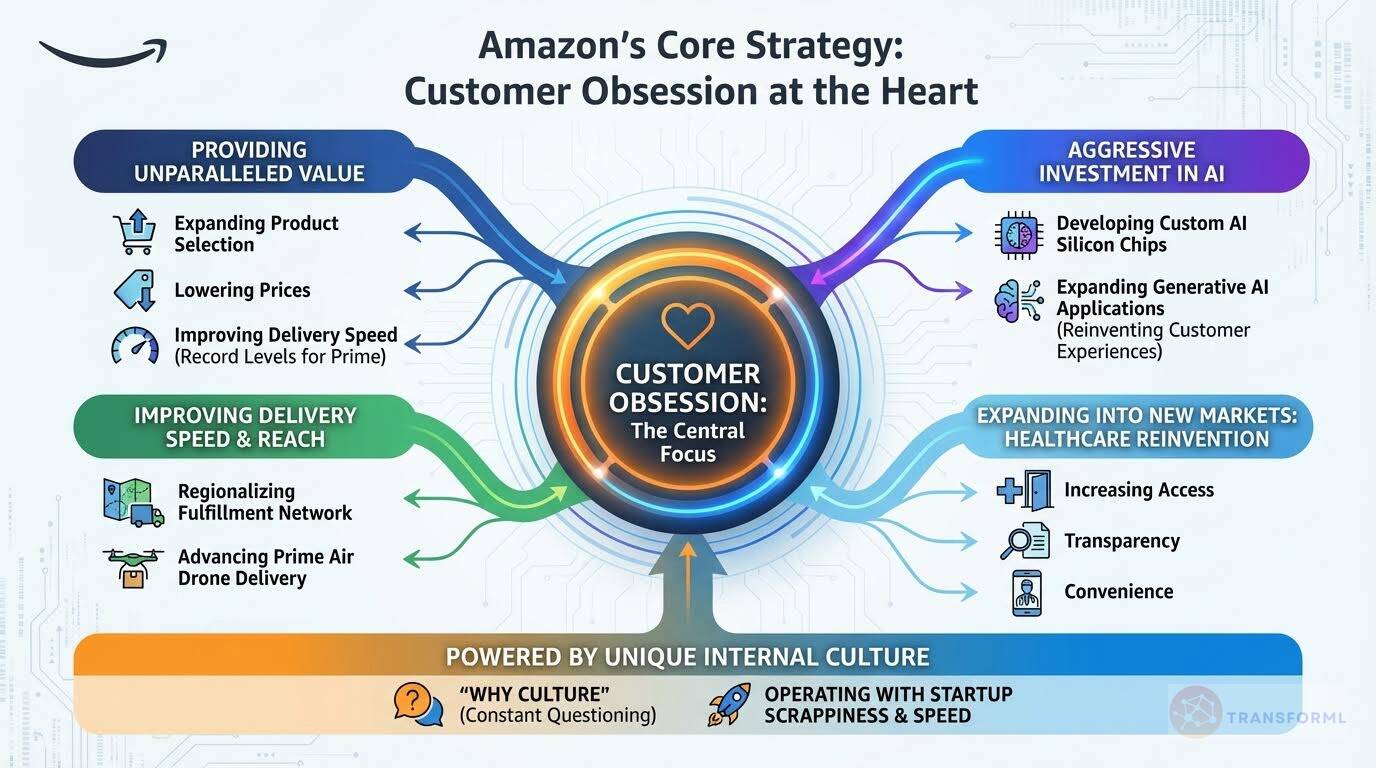Amazon Strategy Analysis

Editor-reviewed by Ahmad Zaidi based on analysis by TransforML's proprietary AI
CEO, TransforML Platforms Inc. | Former Partner, McKinsey & Company
Strategy overview for Amazon
Amazon's strategy is centered on deepening customer obsession by expanding product selection, lowering prices, and delivering faster, more convenient fulfillment at global scale, while simultaneously making aggressive long-term investments in artificial intelligence, cloud computing, and logistics infrastructure. The company is leveraging AWS, custom AI silicon, generative AI platforms, and advanced fulfillment network design to drive productivity, cost efficiency, and differentiated customer experiences across retail, enterprise cloud, advertising, and digital services. Amazon is also extending its strategy into healthcare, last-mile delivery innovation, and underserved markets, reinforcing its flywheel of customer value, operational excellence, and long-term market leadership over short-term profitability.

Key Competitors for Amazon
Walmart
Extensive physical retail presence and established supply chain.
Microsoft
Strong enterprise relationships and cloud computing capabilities.
Google (Alphabet Inc.)
Dominant search engine and AI technology.
Alibaba
Dominant e-commerce presence in China and expanding global reach.
Apple
Strong brand loyalty and integrated hardware-software ecosystem.
Insights from Amazon's strategy and competitive advantages
What Stands Out in Amazon strategy
Amazon's most profound distinction lies in its uniquely integrated and self-reinforcing 'flywheel' ecosystem, combining a dominant e-commerce marketplace, a world-class logistics network, and the leading cloud computing platform (AWS). No competitor possesses this specific triad at scale.
While Walmart is building an ecosystem around retail and fulfillment, it lacks a public cloud platform of AWS's magnitude. Conversely, cloud giants like Microsoft and Google lack Amazon's massive physical logistics and direct-to-consumer retail engine. This integration allows for unparalleled synergies; for instance, the technological innovations and scale of AWS were born from supporting the retail business, and the retail arm provides a massive, real-world testing ground for AI and logistics technologies that are then productized.
Furthermore, Amazon's operationalization of 'Customer Obsession' into a core, tech-driven process for removing friction (e.g., fast delivery, one-click ordering) is a cultural and strategic differentiator that competitors strive to emulate but find difficult to replicate at the same scale and speed.
What are the challenges facing Amazon to achieve their strategy
Amazon faces formidable challenges on multiple fronts, primarily from specialized giants in its key growth sectors. In cloud computing, AWS is in a hyper-competitive battle with Microsoft's Azure and Alphabet's Google Cloud.
Microsoft leverages its deep-rooted enterprise software dominance (Office 365, Dynamics) and its strategic OpenAI partnership to create a powerful on-ramp for Azure adoption, a built-in advantage Amazon lacks. In retail, the challenge is the omni-channel evolution led by competitors like Walmart.
Walmart's strategy to 'Drive Omni-Channel Growth' effectively weaponizes its vast physical store footprint for fulfillment, pickup, and returns, creating a blended physical-digital convenience that Amazon, with its limited physical presence, finds difficult and capital-intensive to counter. Finally, in the digital media space, Prime Video competes against focused content powerhouses. Netflix's singular strategic goal of 'Content Excellence' and Disney's unparalleled library of iconic IP represent a depth of focus on entertainment that challenges Amazon's approach of treating content primarily as a value-add for its Prime membership bundle.
What Positions Amazon to win
Customer-Centric Approach
- Amazon relentlessly prioritizes customer satisfaction, offering low prices, vast selection, and convenient services like fast delivery and easy returns. This focus fosters customer loyalty and drives repeat purchases.
Dominant E-commerce Platform
- Amazon's online marketplace is the largest in the world, providing unparalleled reach for both its own products and those of third-party sellers. This scale creates a network effect, attracting more customers and sellers.
Leading Cloud Computing Services
- Amazon Web Services (AWS) is the market leader in cloud computing, offering a comprehensive suite of services that cater to a wide range of businesses. AWS provides a stable and growing revenue stream with high margins.
Advanced Logistics and Fulfillment Network
- Amazon has invested heavily in its logistics and fulfillment infrastructure, enabling fast and reliable delivery services. This network provides a significant competitive advantage, particularly in meeting the demands of Prime members.
Innovation and Technological Expertise
- Amazon consistently invests in new technologies and services, including AI, machine learning, and satellite communications. This commitment to innovation allows the company to stay ahead of the curve and create new revenue streams.
Strong Financial Performance
- Amazon demonstrates robust financial performance with significant revenue growth, improved operating margins, and strong cash flow generation. This financial strength allows the company to invest in future growth initiatives.
Why Culture
- Amazon fosters a culture of questioning the status quo and constantly seeking ways to improve customer experiences. This 'Why' culture drives innovation and helps the company unlock new opportunities.
Global Presence
- Amazon has a well-established presence in North America, Europe, and Asia, allowing it to serve a diverse customer base and capitalize on growth opportunities in different markets.
What's the winning aspiration for Amazon strategy
Amazon aspires to be the most customer-centric company on Earth by continuously innovating and improving customer experiences through its diverse range of products and services, while also expanding its reach and impact globally.
Company Vision Statement:
Company Vision Statement - We seek to be Earth's most customer-centric company.
Where Amazon Plays Strategically
Amazon competes across a broad range of markets, including e-commerce, cloud computing, digital advertising, and entertainment, targeting diverse customer segments from individual consumers to large enterprises. The company operates globally, with a significant presence in North America, Europe, and Asia, and continues to expand its reach into new geographies and industries.
Key Strategic Areas:
How Amazon tries to Win Strategically
Amazon wins by offering customers unparalleled selection, low prices, and convenience, supported by its advanced technology, efficient operations, and strong brand. The company leverages its scale and expertise to provide innovative solutions and superior customer experiences, creating a sustainable competitive advantage.
Key Competitive Advantages:
Strategy Cascade for Amazon
Below is a strategy cascade for Amazon's strategy that has been formed through an outside-in analysis of publicly available data. Scroll down below the graphic to click on the arrows to expand each strategic pillar and see more details:
Related industry articles:
Obsess Over Customers
Relentlessly focus on making customers' lives better and easier every day by offering compelling value through selection, price, and convenience.
Expand Product Selection Across Stores
Increase the number of unique products available across all Amazon online and physical stores to provide customers with a wider range of choices.
Continue Lowering Prices
Implement strategies to lower prices on frequently purchased items, ensuring Amazon remains the lowest-priced online U.S. Retailer.
Ship at Record Speed to Prime Members
Further optimize the fulfillment network and delivery processes to achieve even faster shipping times for Prime members, exceeding previous records.
Enhance Customer Self-Service Features
Improve customer self-service options to reduce customer service contacts per unit, enhancing efficiency and customer satisfaction.
A Why Culture
Foster a culture of continuous questioning and experimentation to unlock new possibilities and reinvent customer experiences.
Move to Writing Narratives
Transition internal communication from PowerPoint presentations to detailed narrative documents to encourage deeper engagement and critical thinking.
Expand Working Backwards Document Usage
Require teams to create Press Release and FAQ documents before starting new projects to ensure customer focus and address potential challenges.
Be Together Whenever Possible
Encourage in-person meetings and collaboration to foster spontaneous brainstorming and real-time idea evolution.
Tolerate Messy Meetings
Accept and encourage imperfect processes during invention, allowing for exploration of multiple paths and dead ends.
Invest in Artificial Intelligence
Aggressively invest in AI technologies and infrastructure to reinvent customer experiences and drive productivity and cost avoidance.
Develop Custom AI Silicon Chips
Continue developing custom AI silicon chips like Trainium to improve price-performance for training and inference workloads.
Expand Generative AI Application Development
Increase the number of GenAI applications being built across Amazon to meaningfully change customer experiences in various areas.
Enhance AI Model Building Services
Improve the flexibility and capabilities of model-building and inference services in Amazon SageMaker and Amazon Bedrock.
Deploy Frontier Foundation Models
Deploy frontier foundation models in Amazon Nova to provide lower cost and latency for customer applications.
Improve Delivery Speed and Reach
Continuously improve delivery speed and expand reach to serve more customers, including those in rural areas.
Regionalize Fulfillment Network
Further refine the regionalization redesign of the fulfillment network to enable faster delivery times.
Introduce New Placement Algorithms
Improve placement algorithms to optimize inventory distribution and reduce shipping distances.
Expand Same-Day and Overnight Delivery
Extend Same-Day and Overnight Delivery services to more smaller cities and towns across the U.S.
Advance Prime Air Drone Delivery
Continue development and deployment of Prime Air drones to deliver items to customers inside an hour.
Reinvent Healthcare Experience
Transform the healthcare experience by improving access, transparency, and convenience for customers.
Iterate Quickly on Selection
Expand the selection of medications and healthcare products available through Amazon Pharmacy.
Iterate Quickly on Transparency
Improve price transparency for medications on Amazon Pharmacy, providing clear information on insurance coverage and pricing options.
Iterate Quickly on Physical Clinic Capacity
Increase the physical clinic capacity of One Medical to provide more convenient access to primary care physicians.
Streamline Appointment Scheduling
Improve the speed and ease of scheduling appointments with primary care physicians and specialists through One Medical.
Operate Like a Startup
Maintain a culture of speed, scrappiness, and ownership to drive innovation and deliver results for customers.
Focus on Solving a Real Customer Problem
Ensure that all new projects and initiatives are focused on solving real customer problems or meaningfully improving customer experiences.
Need Builders
Recruit and hire more inventors and builders who are constantly dissecting customer experiences and seeking improvements.
Want Owners
Increase the ratio of individual contributors versus managers to create flatter organizations where owners feel accountable and can move rapidly.
Eliminate Bureaucracy
Identify and eliminate unnecessary processes and red tape that slow down builders and frustrate teammates.
Be Scrappy
Encourage leaders to achieve the most with the least number of resources, emphasizing lean team structures.
Focus on Long-Term Value Creation
Prioritize long-term market leadership and shareholder value over short-term profitability, making bold investment decisions and managing resources wisely.
Make Bold Investment Decisions
Prioritize investment decisions based on long-term market leadership considerations rather than short-term profitability.
Measure Program Effectiveness Analytically
Continuously measure the effectiveness of programs and investments analytically, jettisoning those that do not provide acceptable returns.
Maintain Lean Culture
Continually reinforce a cost-conscious culture, particularly in a business incurring net losses.
Balance Growth and Profitability
Balance the focus on growth with emphasis on long-term profitability and capital management.
Read more about industry strategies
Source and Disclaimer: This analysis is based on analysis of Annual reports for 2024. For informational purposes only (not investment, legal, or professional advice). Provided 'as is' without warranties. Trademarks and company names belong to their respective owners.
